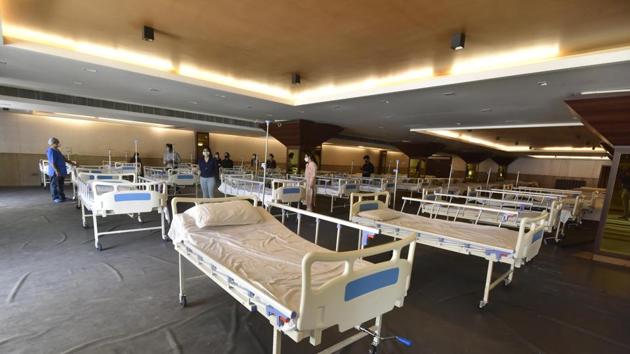Efforts on to boost health care infrastructure in Delhi as cases surge
As of Saturday, Delhi had over 12,000 hospital beds for Covid-19 patients across government and private hospitals, according to the data on the “Delhi Corona” app.
The Delhi government is focusing on ramping up hospital beds and ensuring the availability of medical workers in the backdrop of a steady a rise in coronavirus disease (Covid-19) cases, laying stress on two crucial aspects of the city’s health infrastructure that could define the fight against the infection in the coming days.

The national capital recorded 3,630 cases on Saturday — the biggest single-day jump — as its tally reached 56,746 infections.
As of Saturday, Delhi had over 12,000 hospital beds for Covid-19 patients across government and private hospitals, according to the data on the “Delhi Corona” app. Authorities also plan to use 77 banquet halls and 40 hotels for treatment of Covid-19 patients, a move that is expected to add about 16,000 more beds to Delhi’s health infrastructure.
Then, using railway coaches for treatment will translate to 8,000 additional beds. While the Delhi Sikh Gurudwara Management Committee will provide another 850 beds in eight establishments run by it, the government will also create 450 beds in its upcoming hospital in Burari.
Of the 12,647 hospital beds available now, 47% are already occupied. While the occupancy rate at government hospitals ins 43% , the beds in private hospitals are 50% full.
When it comes to beds equipped with ventilators, the occupancy rate is higher. Almost 69% of all beds with ventilators – both in private and government hospitals – are full. Over 71% of the 368 ventilators in private hospitals are already occupied.
At present, only those with severe symptoms such as elevated respiratory rate of over 30 breaths per minute (normal is 12 to 20 breaths per minute) or oxygen saturation of less than 90% (normal is 95 to 100%) have to be admitted to hospitals.
People with mild symptoms can remain in home isolation if they have no comorbidities, and have a separate room and a bathroom to follow proper isolation protocols. Those with no such facility can stay in Covid care centres. And those with moderate to severe symptoms are admitted to Covid Health Centres or Covid hospitals as per need.
The government estimates 150,000 beds will be required by the end of June. The projection is based on the report of a five-member committee set up in early June, which said the city would record 100,000 cases by the end of the month and need 15,000 beds for those with severe symptoms of the infection.
The requirement for beds will go up to over 40,000 by mid-June, according to the committee members. And the number would translate to 80,000 beds by July-end.
The government increased the numbers further when it could not restrict the services of its hospitals for Delhi residents.
Makeshift hospitals such as railway coaches, however, cannot treat those with severe symptoms of the infection. The challenge for the government is to add more ventilator and ICU beds in its hospitals.
The city government has received 200 ventilators from the central government and plans to buy 300 more. It will also ensure that all the beds in the hospitals have oxygen support, according to officials from the department.
The state government has also sought the help of central hospitals such as AIIMS and Ram Manohar Lohia Hospital to increase the number of ICU beds. At Lady Hardinge Medical College, two of the large hospital wards are being converted into Covid-19 beds. Almost all the beds in the hospital have oxygen support.
“Around 36 beds in our Covid-19 area have oxygen support along with invasive and non-invasive ventilators. The other beds are also all oxygen supported. The orange zone – where suspected Covid-19 patients are admitted – also have all these facilities as several of the patients are actually testing positive,” said Dr NN Mathur, director of the hospital.
At the centrally run All India Institute of Medical Sciences (AIIMS), 100 beds – including 30 ICU beds – have been added in the newly constructed burns ward for the treatment of Covid-19 patients.
“We are also planning to increase our bed strength at the Jhajjar centre by about 500 beds. This will also include ICU beds. In total, AIIMS currently has about 100 ICU beds for Covid-19 patients,” said Dr DK Sharma, medical superintendent , AIIMS.
Another challenge the government faces is increasing the manpower at its hospitals, as well as the makeshift ones. For its own hospitals, the state government has decided to hire final-year MD/MS/ DNB (post-graduation medicine degree) students and final-year UG (undergraduate) and PG nursing students.
Another administrator of a Delhi government Covid-19 hospital said, “We have been asked to recruit more staff, but it is not that easy. We do not get a lot of people for the walk-in interviews. So the medical and nursing student would be a great help. They can be trained for a few days and posted anywhere in the hospital.”
For the makeshift hospitals in banquet halls and stadiums, the government has tied up with various doctors’ organisations in the city. “The government is in discussion with the doctors and it is likely to be finalised soon. They will have to take responsibility of running a section of the beds, providing manpower etc. As for consumables, the arrangement is being worked out,” said Dr Arun Gupta, the president of Delhi Medical Council who is also a member of the expert committee that gave the projections on the number of cases and beds required.
All 40 hotels have been attached to private hospitals, which provide medical staff and consumables.




